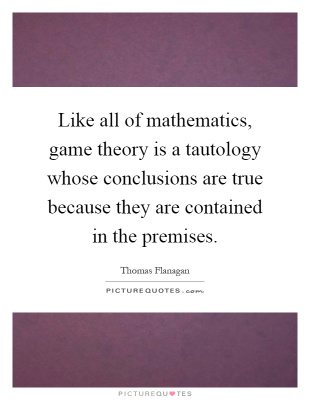From Lars Syll Applied game theory is a theory of real-world facts, where we use game theoretical definitions, axioms, theorems and (try to) test if real-world phenomena ‘satisfy’ the axioms and the inferences made from them. When confronted with the real world we can (hopefully) judge if game theory really tells us if things are as postulated by theory. But there is also an influential group of game theoreticians that think that game theory is nothing but pure theory, an axiomatic-mathematical scientific theory that presents a set of axioms that people have to ‘satisfy’ by definition to count as ‘rational.’ Instead of confronting the theory with real-world phenomena it becomes a simple matter of definition if real-world phenomena are to count as signs of ‘rationality.’ This makes for
Topics:
Lars Pålsson Syll considers the following as important: Uncategorized
This could be interesting, too:
tom writes The Ukraine war and Europe’s deepening march of folly
Stavros Mavroudeas writes CfP of Marxist Macroeconomic Modelling workgroup – 18th WAPE Forum, Istanbul August 6-8, 2025
Lars Pålsson Syll writes The pretence-of-knowledge syndrome
Dean Baker writes Crypto and Donald Trump’s strategic baseball card reserve
from Lars Syll
Applied game theory is a theory of real-world facts, where we use game theoretical definitions, axioms, theorems and (try to) test if real-world phenomena ‘satisfy’ the axioms and the inferences made from them. When confronted with the real world we can (hopefully) judge if game theory really tells us if things are as postulated by theory.
 But there is also an influential group of game theoreticians that think that game theory is nothing but pure theory, an axiomatic-mathematical scientific theory that presents a set of axioms that people have to ‘satisfy’ by definition to count as ‘rational.’ Instead of confronting the theory with real-world phenomena it becomes a simple matter of definition if real-world phenomena are to count as signs of ‘rationality.’
But there is also an influential group of game theoreticians that think that game theory is nothing but pure theory, an axiomatic-mathematical scientific theory that presents a set of axioms that people have to ‘satisfy’ by definition to count as ‘rational.’ Instead of confronting the theory with real-world phenomena it becomes a simple matter of definition if real-world phenomena are to count as signs of ‘rationality.’
This makes for ‘rigorous’ and ‘precise’ conclusions — but never about the real world. Pure game theory does not give us any information at all about the real world. It gives us absolutely irrefutable knowledge — but only since the knowledge is purely definitional.
Mathematical theorems are tautologies. They cannot be false because they do not say anything substantive. They merely spell out the implications of how things have been defined. The basic propositions of game theory have precisely the same character.
Pure game theorists, like Ken Binmore, give us analytical truths — truths by definition. That is great — from a mathematical and formal logical point of view. In science, however, it is rather uninteresting and totally uninformative! Even if pure game theory gives us ‘logical’ truths, that is not what we are looking for as scientists. We are interested in finding truths that give us new information and knowledge of the world in which we live.
Scientific theories are theories that ‘refer’ to the real-world, where axioms and definitions do not take us very far. To be of interest for an economist or social scientist that wants to understand, explain, or predict real-world phenomena, the pure theory has to be ‘interpreted’ — it has to be ‘applied’ theory. A ‘pure’ game theory that does not go beyond proving theorems and conditional ‘if-then’ statements — and do not make assertions and put forward hypotheses about real-world individuals and institutions — is of little consequence for anyone wanting to use theories to better understand, explain or predict real-world phenomena.
Pure game theory has no empirical content whatsoever. And it certainly has no relevance whatsoever to a scientific endeavour of expanding real-world knowledge.
